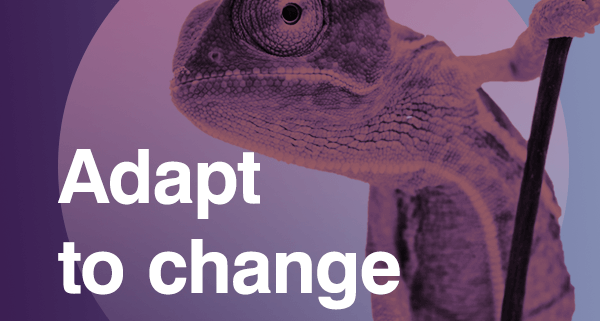Why change is so difficult, and five tips to make it less painful
At IDEXX Animana, we know that change is not always easy – we have daily contact with the veterinarians and paraveterinary workers who are responsible for making changes – from adding new users, to implementing Automatic Reminders.
We’ve learnt that there’s no such thing as a small change. Sure, creating a user in Animana is easy, but what about everything else associated with a new employee at your practice? They need to learn their way around your practice, and be trained – which impacts other staff involved in their training, which in turn impacts practice productivity – and ultimately – patient care.
In short, changes of any size affect daily business. How you deal with these changes determine how changes can affect your work and your life.
Five tips to reduce the impact of change
1. Don’t be afraid of change
As human beings, we like to stay in our comfort zone – it’s normal for us to fear change – change is a step towards the unknown and the unknown is bound to have disruptive consequences.
Fortunately, although we can’t control changes (or events), we can control how we react to them. We must focus our mindset on the positives of change. You can do this by assessing how you have dealt with change before – How did you handle it? What worked well? What became easier or better?
By focussing on the positives in the past, we begin to see more positive in future changes also.
2. Find meaning in the change
“I’m not sure if that’s the right decision”
Do you recognise this thought? You’re not alone – like everyone else, you wonder whether the decisions you make are the right ones;
- Should I perform a blood test?
- Should I perform an X-ray?
- Should I send them home with medication?
These are questions you probably ask yourself a few times a day, yet you always know how to do the right thing because of your knowledge and experience.
Knowing more about the change and the reasons for it, and what is important is an essential step to successfully embrace change – so seek knowledge from your peers and ask questions.
3. Use Past Experience wisely
“But we’ve always done it like this”
When was the last time you thought this? This thinking can limit opportunities and possibilities – whether it’s an action in the consultation room or a conversation with a pet owner.
Consider an unusual customer request, which you would usually dismiss straight away – perhaps following the request you mean that you learn a new experience (perhaps you don’t know everything!), who knows – the new experience may even lead to practice profits.
Past experience has a big impact on the way you react to change – experience is important, but don’t let it prevent you from new opportunities or experiences which may be beneficial – just because something hasn’t worked in the past doesn’t mean it won’t work next time.
4. Quantify your fears
Change can be scary and it’s daring to step out of our comfort zone, but we can train our subconscious so that scary things become a routine task.
To do this, start by making a list of things you would like to do, but have been too afraid to do. Next, dive into the list – starting with the most accessible. Have fun, challenge yourself and get used to the feeling that you are afraid and step into the unknown.
5. Focus
“I’m too stressed to perform properly”
Stress is a normal response to changes and challenges in everyday life. In the short term, stress can help you perform better under pressure, but constant stress can cause problems for your health.
Finding positive ways to deal with the stress and pressure we face every day is the key to our survival, both physically and emotionally. Small changes can have a positive effect on the daily work in a clinic.
Here are some small changes that can be applied quickly and successfully to help you focus and reduce stress:
- Define Structure.
- Make clear divisions in your diary throughout the day, so you know when you are doing what. Read more about the use of Agenda books in Animana
- Work with colours in your diary, keeping everything clear and defined at a glance. View the calendar settings in Animana
- Work with Tasks.
- Working with tasks or lists gives you structure and an overview of your workload. Read more about working with Tasks in Animana (to-do lists).
- Automate.
- Do as much as you can without lifting a finger – for example, automating your practices reminders or vaccination calls can save hours a week and reduce a huge administrative burden. Read more about sending reminders automatically from Animana.
Let’s talk about what IDEXX software can do for your practice
Complete the form below and we’ll get back to you.







